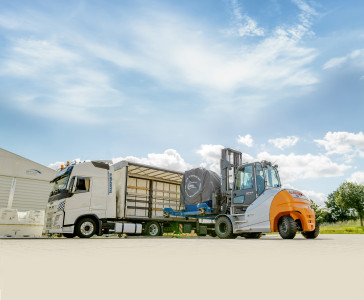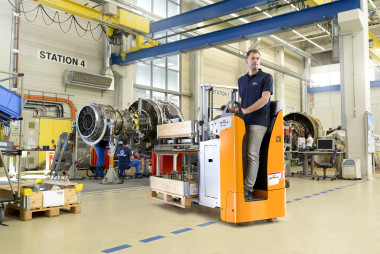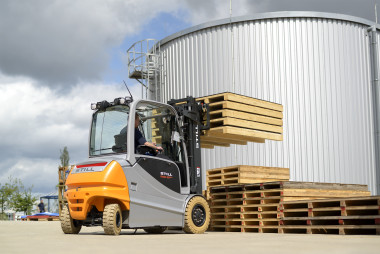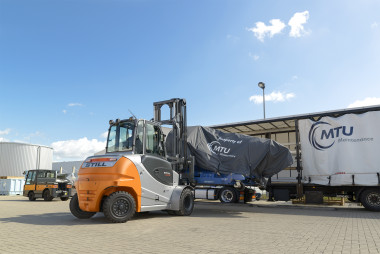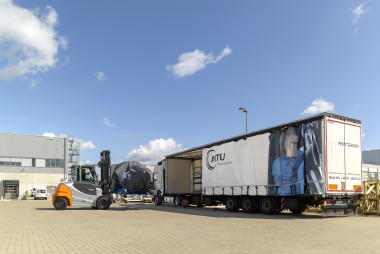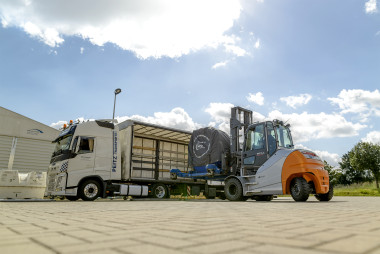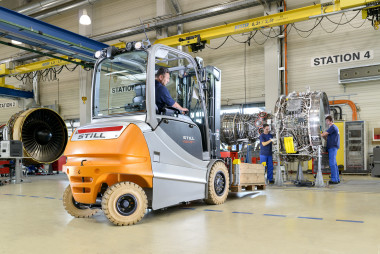MTU Maintenance. Sustainable maintenance. Foundation for success!
Sector: Aviation
Company: Four thousand employees, part of MTU Aero Engines and one of the top five global suppliers of maintenance services for commercial aircraft engines.
Challenge: To standardise the existing fragmented fleet of around 100 industrial trucks.
Solutions: Standardisation of truck models Increasing truck usage while reducing fleet size by 38%
STILL products: Service, RX 60-80 8-tonne electric forklifts, FM-X reach trucks and various warehouse trucks.
MTU Maintenance Hannover GmbH counts many STILL industrial trucks among its numbers. A proven expert in servicing and maintenance, the com- pany uses this specialist knowledge to maintain its own fleet of forklifts.
MTU Maintenance Hannover GmbH specialises in the maintenance of capital goods and equipment, in particular the inspection, repair and overhaul of medium/large engines for commercial aircraft. It also uses its expertise to maintain its own fleet of around 100 industrial trucks, which it runs very cost-effectively thanks to its sustainable servicing approach, which keeps the trucks running well beyond their average lifespan. “We compared our system with various leasing options and found it was significantly more cost-effective to buy our own forklift fleet,” explains Willem le Roux, who oversees internal transport at MTU Maintenance.
The company’s centralised fleet management system manages the procurement and maintenance of the forklift trucks and ensures the requisite trucks are available for the different departments in the designated parking bays with charging stations. These bays are always located at an intersection between two or more departments and are fitted with a traffic light system which is visible at long range. “Staff can see a green light from some distance and know that there is a forklift ready for use in that bay. This system provides clarity and saves unnecessary to-ing and fro-ing,” says Mike-Werner Wentsch, who is responsible for fleet management.
The fleet currently comprises trucks from three German manufacturers. STILL sup- plies the majority, with over 70 industrial trucks in total. The most popular trucks are the 62 high lift pallet trucks from the EXV and EGV series, which have a load capacity of 1.2 and 1.4 tonnes. The new EXV 14 model, with power-assisted steering and improved residual load capacity, is particularly impressive. MTU Maintenance also operates three counterbalanced trucks from the RX 20 and RX 60 series, an R 06 tractor, and five reach trucks from STILL’s FM-X 20 and FM 14 series. “STILL is one of our preferred brands because we’ve been really impressed with the products and service,” explains André Frömbling, who heads up internal transport as part of Willem le Roux’s team.
Standardisation increased by more than 20%
Since 2008 MTU has been working to standardise its forklift fleet and has there- fore decided to focus on just two brands. “In the past, each department ordered its own forklifts, which meant we built up a large stock of trucks,” André Frömbling recalls. As part of its centralisation efforts, MTU Maintenance also spent six weeks analysing the forklift truck requirements across the company and developed seven standardised categories of truck.
The resulting centralised fleet management system has enabled MTU Maintenance to reduce its stock of trucks by 38 percent and also significantly increase the usage of its fleet. “By standardising the forklift fleet, we have also reduced the number of models in use, meaning we don’t need as many replacement parts in stock,” explains Mike-Werner Wentsch. Many components, including the batteries for the electric forklifts, are also interchangeable. Moreover, old industrial trucks can be stripped of any useful spare parts before they are finally taken out of service, which helps optimise the running costs for the fleet. “Before we part with a decommis- sioned forklift, we remove any expensive parts such as engines, direction sensors, cable harnesses, pump units and tow bars and put them into storage,” explains André Frömbling.
Sustainable maintenance concept
Mike-Werner Wentsch uses an Excel-based software tool to keep a constant over- view of all the key performance indicators for the fleet: construction year, operating hours, utilisation rate, battery life and repair costs can all be called up whenever needed. “Our sustainable maintenance concept not only reduces the costs for replacement parts, it also increases the trucks’ service life,” he explains. The oldest truck in the fleet was produced in 1991 and continues to be cost-effective to run. “On average, the trucks far exceed the lifespan of eight years or 8000 operating hours recommended by many manufacturers,” stresses André Frömbling. The same is true for the batteries, which MTU Maintenance takes great care to maintain. Just a handful of employees are responsible for maintaining the batteries with scheduled cleaning and water refills. To simplify the work involved, MTU has even built a trolley to carry all the necessary tools, water tank and pump. It’s a work-intensive process but the benefits are clear: the meticulous cleaning prevents current leakage and corrosion of the battery terminals, meaning that even older MTU batteries function like new. Indeed the targeted and systematic maintenance pro- cess has noticeably increased the lifespan and reliability of the batteries. “Since we introduced the regular maintenance and cleaning system, we’ve virtually eliminated downtimes caused by faulty batteries,” Mike-Werner Wentsch confirms.
Seamless availability
Nonetheless, major maintenance or repair work is still outsourced to the manufac- turer’s subsidiaries. “We have built up a fantastic trusted partnership with STILL since 2008. In most cases, we can contact the engineers responsible for our trucks directly, which is quite unusual,” explains André Frömbling.
All in all, MTU’s maintenance system, stock of replacement parts and close relation- ship with STILL have enabled it to minimise downtimes for its forklift fleet – a real advantage when running its three-shift operations. “Even though we’ve reduced the size of our fleet by 38 percent, we are still able to guarantee that our industrial trucks are available whenever and wherever they’re needed,” confirms Willem le Roux. That said, he’s not stopping there: he already has plans to convert the fleet from lead-acid to lithium-ion batteries in order to further optimise operating costs. The first trials in partnership with STILL are already underway.
Background: MTU Maintenance Hannover GmbH
MTU Maintenance is a division of MTU Aero Engines and one of the top five global suppliers of maintenance services for commercial aircraft engines. The company services more than 30 types of engine, the biggest range of any provider worldwide. With 4000 employees, 17,000 workshop visits under its belt and 35 years’ experi- ence, MTU Maintenance prides itself on its exceptional customer service, exacting quality standards and innovative MRO solutions.
MTU Maintenance Hannover GmbH, based in Langenhagen, is the heart of the MTU Maintenance network. It specialises in the maintenance of medium/large commer- cial aircraft engines and is also the competence centre for high-tech repairs. It was founded by MTU in 1979 as the company’s first maintenance branch, giving the com- pany a major foothold in the maintenance market for commercial aircraft engines, and today employs more than 1900 highly-skilled staff at its site in Langenhagen in Lower Saxony.

